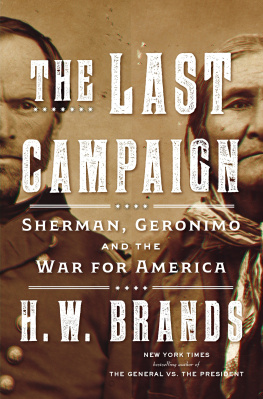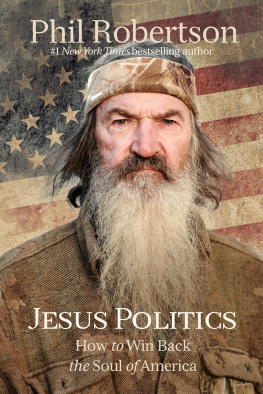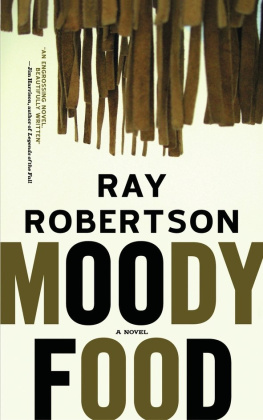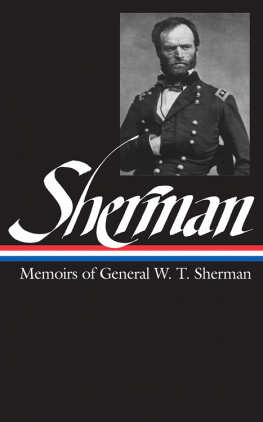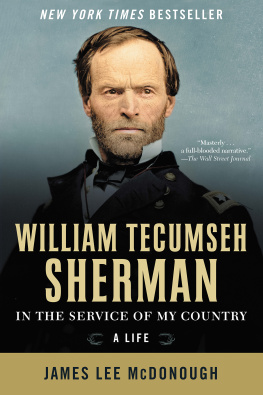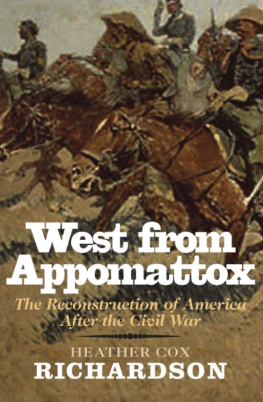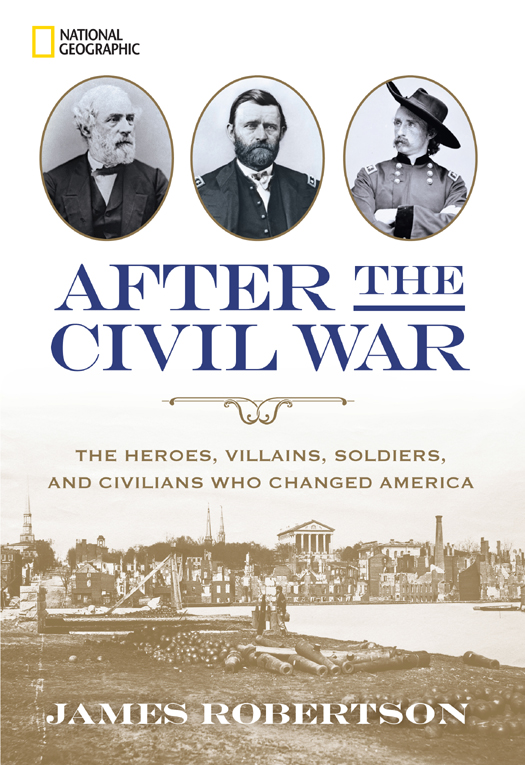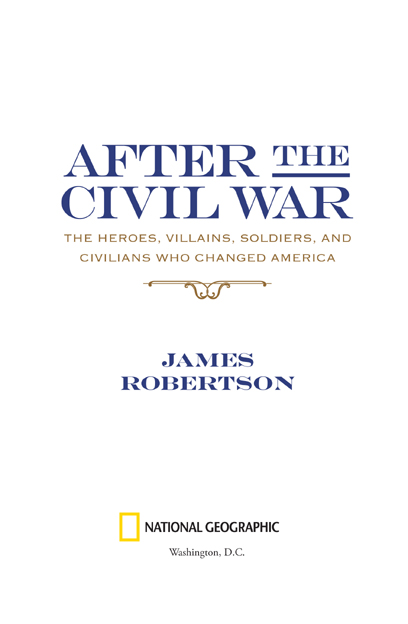Published by the National Geographic Society
1145 17th Street N.W., Washington, DC 20036
Copyright 2015 James Robertson. All rights reserved. Reproduction of the whole or any part of the contents without written permission from the publisher is prohibited.
Library of Congress Cataloging-in-Publication Data
Robertson, James I.
After the Civil War : the heroes, villains, soldiers, and civilians who changed America / James Robertson.
pages cm
Includes bibliographical references.
ISBN 978-1-4262-1562-9 (hardcover : alk. paper)
eBook ISBN: 978-1-4262-1571-1
1. United StatesHistory1865-1898Biography. 2. United StatesHistoryCivil War, 1861-1865Influence. 3. United StatesBiography. I. Title.
E663.R67 2015
973.8dc23
2015006104
The National Geographic Society is one of the worlds largest nonprofit scientific and educational organizations. Its mission is to inspire people to care about the planet. Founded in 1888, the Society is member supported and offers a community for members to get closer to explorers, connect with other members, and help make a difference. The Society reaches more than 450 million people worldwide each month through National Geographic and other magazines; National Geographic Channel; television documentaries; music; radio; films; books; DVDs; maps; exhibitions; live events; school publishing programs; interactive media; and merchandise. National Geographic has funded more than 10,000 scientific research, conservation, and exploration projects and supports an education program promoting geographic literacy. For more information, visit www.nationalgeographic.com.
National Geographic Society
1145 17th Street NW
Washington, DC 20036-4688 USA
For information about special discounts for bulk purchases, please contact National Geographic Books Special Sales:
For rights or permissions inquiries, please contact National Geographic Books Subsidiary Rights:
Interior design: Melissa Farris and Katie Olsen
v3.1
To my wife, Bettywho is always there
INTRODUCTION
T ODAY, 150 YEARS AFTER THE FINAL SHOTS echoed over the land, the Civil War remains the most riveting period in our nations history. The four years of the countrys struggle against itselfNorth versus South, brother versus brotherstill has the power to stir our interest and imagination. What receives less attention is the tremendous impact that the war had on Americas future.
Appomattox was not an end; it was the beginning of an unprecedented period of growth. The same industrial forces that propelled the Union armies to victory continued to expand until they vaulted the United States to world power. Thomas Jeffersons vision of a nation of farmers evaporated in the headlong rush following 1865.
Many engaged in the war had a personal role in influencing the future. Their impacts showed in ways both expectedsuch as radicals seeking reprisal on the impoverished Southand unexpected, such as teenager James Hangers loss of a leg leading to modern prosthetics. This book traces the stories of those war heroes, villains, soldiers, and civilians and draws out their enduring legacies. Wars effects on these private lives also changed the collective life of the nation.
Abraham Lincoln had hoped for a peace with malice toward none and charity for all. That would not come to pass for the conquered South. Those who succeeded the martyred president insisted that slavery be abolished and the Confederacy punished for its sins. Radical Republicans led by Thaddeus Stevens and Charles Sumner quickly took control from Secretary of State William Seward and his moderate associates.
Beyond Washington politics, the harsh new laws enforced by military occupation implanted discontent in the South for decades to come. Robert E. Lees pleas to Southerners to bind the nations wounds fell on deaf ears. Strident voices such as Jubal Earlys created a cult of The Lost Cause. Any Southerner who dared take advantage of Federal controleven wartime heroes such as James Longstreet and John Mosbywere traitorous scalawags. Only when Reconstruction ended in 1877 did reconciliation begin.
The Civil Wars long shadow reached future warfare. The advent of the rifle, especially Christopher Spencers repeating carbine, provided an accurate, murderous fire that changed military tactics forever. William Sherman, the father of total war, initiated a pattern of wholesale destruction that wreaked havoc on the statesand in time, the world. Bedford Forrests cavalry strategy of quick-strike advances foreshadowed tactics the German Blitzkrieg employed in World War II.
The war also brought major advances in medicine, thanks in large part to Dr. Jonathan Lettermans determination to treat men immediately on the field. Quartermaster General Montgomery Meigs pioneered the logistics of equipping and moving hundreds of thousands of soldiers, setting a new precedent for staff officers.
What happened in 186165 was likewise the grandest media event in American history. Mathew Bradys photographs brought the impact of battle into parlors in astonishing detail. Battleground sketches and newspaper drawings by such powerful postwar artists as Winslow Homer and Thomas Nast turned inanimate scenes into human pathos. Among the ranks of military nurses were famous authors Louisa May Alcott and Walt Whitman.
As reunification painfully began, national attention turned toward the unspoiled West. The Great Plains and beyond had as residents only Native Americans and buffalo. While some army commanders sallied forth heedlessly (George Custer was a classic example), a more steely-eyed leader like Philip Sheridan ruthlessly slaughtered everything in his path. Towns sprouted wherever roads crossed. A handful of adventurers, as personified by Montana territorial governor Thomas Francis Meagher and murderous lawman William Hickok, would spawn popular legends in the Wild West.
Many veterans used wartime fame as a springboard into politics. A prime example is George McClellan, a general who ran for president while the war was still raging. Ambrose Burnside, an equally incompetent but far more amiable general, found repeated success in the political arena. Name recognition also enabled rascals like Daniel Sickles and Judson Kilpatrick to embarrass the nation in a way that their less-than-exemplary military careers could have foretold.
Seven American presidents are associated with the Civil War. Abraham Lincoln towers above them all. Late 19th-century presidentsstarting with James Buchanan and Andrew Johnsonare remembered as mediocrities who let the country flounder through unrest. In a span of 40 years, three of the presidents were murdered. A look at the assassins provides striking insight to the fitful times.
If these presidents were ineffectual, hardly the same could be said of the private sector. Industrial titans such as Andrew Carnegie, Philip Armour, and John D. Rockefeller seized on wartime opportunities, while financial legends Jay Gould and J. P. Morgan netted high profits from Union needs. These controversial magnates would go on to build legendary empires, entrenching the roots of capitalism that catapulted America onto the world scene.


